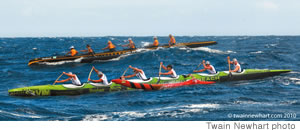Everything Evolves, Even Canoes

Team Kamanu (green) and Team Livestrong battle it out in the Kaiwi Channel
How many of you remember the “gray brick”? You know, the massive cinder block with black antenna. The first cellular phone weighed 2 pounds and a fully charged battery gave you 30 minutes of talk time. Its price tag was hefty, too, at $3,995. It was bulky and over-priced, but people bought them.
That was 1984, and technology has evolved. Now cell phones fit in the palm of our hand and companies literally give them away to secure service contracts.
Evolution is good.
It happens in every industry and every line of business including sports. Baseball, football, basketball – all have experienced changes through the years, changes that have benefited those who play and watch the game. Outrigger canoe paddling should be no different.
The recent Pa’a ‘Eono Hoe canoe race has changed the sport forever. The event featured a six-man iron format. The six you start with on Molokai are the six you finish with 32 miles later on Oahu. Many say the format was long overdue.
But race director Manny Kulukulualani took it one step further by opening the field to “open canoe designs.” Canoe builders were allowed to craft vessels with no specifications or limitations. The boats were built for speed, yet durable enough to handle the nasty Kaiwi Channel. Several gave it a go including boat builders from Kamanu Composites, who built two sleek canoes that were far lighter than the traditional 400-pound fiberglass canoes.
“The open design division is reinvigorating outrigger canoeing,” says Luke Evslin. “Not only will the canoes get faster and more fun, but it opens up the design and manufacturing process to everyone.”
Team Kamanu made up of Evslin, Billy Pratt, Jimmy Austin, Justin Watts, Travis Grant and Scott Hendricks won the race in three hours, 56 minutes, 40 seconds. Team Livestrong, which also used a new-design canoe, finished more than 12 minutes back at 4:09:10. Team PA’A, which used a traditional fiberglass canoe, finished third at 4:12:36.
“The boats on the water were literally the first generation of unlimited canoes in Hawaii in 34 years,” says Evslin. “We were catching runners all the way across that I’ve never come close to experiencing in a regulation canoe. It’s incredible to think what will happen over the next couple of years.”
Traditionalists are taking a “wait and see” approach, and that’s understandable. But moving forward does not equal disrespect. Innovation will never replace tradition, but sitting idle while the rest of the world evolves makes little sense.
“The Pa’a ‘Eono Hoe has sparked the creativity of canoe builders around Hawaii and once again the canoes are taking center stage,” says Evslin.
Like the “brick,” these new canoes won’t be for all. But prices will adjust as supply catches up with demand. In the meantime, race organizers can “level the playing field” with a separate division, similar to what’s in place now for our sacred koa canoes.
We live in a time when speed matters and, thanks to innovation, we’ve all benefited from improved technology – faster microwaves, faster cell phones and now faster canoes. Certainly cell phones don’t carry the same spiritual significance as our wa’a. But while we embrace our past, we cannot let it stop us from moving forward.
You must be logged in to post a comment.




There are no comments
Add yours